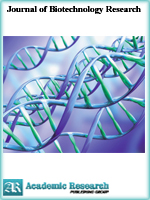Journal of Biotechnology Research
Online ISSN: 2413-3256
Print ISSN: 2413-8878
Print ISSN: 2413-8878
Quarterly Published (4 Issues Per Year)

Archives
Volume 6 Number 5 May 2020
Performance Evaluation of Chickpea Varieties (Cicer arietinum L.) at Bule Hora and Abaya Southern Ethiopia
Authors: Ejigu Ejara ; Kemal Kitaba ; Zinash Misganaa ; Ganene Tesama
Pages: 34-40
DOI: doi.org/10.32861/jbr.65.34.40
Abstract
Chickpea is among the major pulse crops grown in southern Ethiopia including Borana and West guji zone. The area has potential to the production of Chickpea for food and nutrition security as well as export commodity. However, scarcity of varieties that fit to the environment is one of the major constraints of production. Therefore, this experiment was conducted to evaluate 9 chickpea varieties to select adaptable varieties for yield and agronomic traits. The field experiment was conducted in 2017 and 2018 at two locations (Abaya and Bule hora) and varieties were planted in Randomized complete block design. Data were collected on yield and important agronomic traits. Analysis of variance computed for individual locations and combined analysis over locations revealed significant variations among varieties. Moreover, Varieties showed a grain yield as high as 1087.5kg/ha and 873.79kg/ha at Bule hora and Abaya respectively. Minjar variety is significantly high yielding variety at both locations with yield advantage of 26.13% and 52.07% over variety mean at Bule hora and Abaya respectively and therefore recommended for both locations and locations with similar agro ecologies.
Effect of Milk Thistle (Silybum marianum (L.) Gaertn) Seed Extract on Bacterial Activities and Growth of Human Liver Cancer Cells
Authors: Basma S. M. Ali ; Abdelaleim I. ElSayed ; Mahmoud A. Doheem ; Ahmed M. Abo Eita ; Ahmad A. Omar
Pages: 27-33
DOI: doi.org/10.32861/jbr.65.27.33
Abstract
Silymarin is a polyphenolic flavonoid mixture isolated from milk thistle which is believed to be responsible for the plant’s hepatoprotective action. Silymarin is hepatoprotective flavonoid drug available as bio marker in Silybun marianum (common name milk thistle). Silymarin is being used in treatment of various liver disease of different etiology because of its hepatoprotective action. Phytochemicals are playing a vital role for the treatment of different types of diseases and still used in both traditional and modern medication system. The phytochemical analysis of milk thistle seeds extract indicated that the plant is rich in secondary compounds. The results revealed that milk thistle seeds contain high amount of total phenolic, flavonoid and antioxidant compounds. The antibacterial activities of the ethanol seeds extract of milk thistle was tested against Gram-positive bacteria (Staphylococcus aures) and Gram-negative bacteria (Salmonella entirica). Antibacterial effects of crude extract were performed using modified Kirby-Bauer disc diffusion technique to determine the zone of inhibition. The results demonstrated that ethanol seeds extract of milk thistle is shown strong inhibition zone against Staphylococcus aures and Salmonella entirica compared to the control. Also, milk thistle seeds extract showed highly anticancer activity. This medicinal plant could be developed into affordable and safe standardized herbal products and may serve as a source of new molecules for broad-spectrum anticancer, antimicrobial agents.



